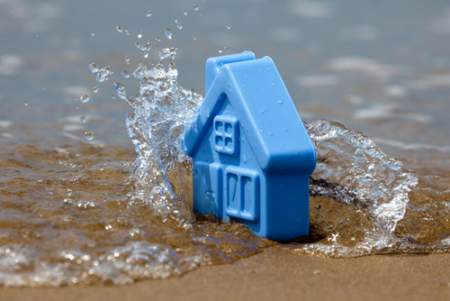When you initially bought your home, it may not have been in a flood zone. However, the Federal Emergency Management Agency (FEMA) created and frequently updates the National Flood Insurance Plan which designates Special Flood Hazard Areas (SFHA). High-risk properties, or houses in an SFHA, are those that exist in a 100-year floodplain. Being in a 100-year floodplain area means there’s a one-in-four chance that the home will be subject to flooding within the 30-year lifespan of the home mortgage loan.
Because of the risk factor associated with SFHA locations, lending companies now require flood insurance for homes purchased in these places, in addition to standard homeowners insurance policies.
Naturally, these newly mapped floodplain areas have a severe effect on home values due, in part, to fear-factor of flooding and the requirement of additional insurance payments. To maximize your equity now is the best time to sell your home with flood insurance.
Working with the Right Agent
 Before you take another step toward listing your house for sale, research your area for the most highly qualified real estate agent who specializes in selling properties in flood zones. The agent with knowledge and experience in flood-zoned properties can be an incredible asset in helping you sell your home to maximize equity.
Before you take another step toward listing your house for sale, research your area for the most highly qualified real estate agent who specializes in selling properties in flood zones. The agent with knowledge and experience in flood-zoned properties can be an incredible asset in helping you sell your home to maximize equity.
Understanding Flood Maps and the Flood Insurance Rate Map (FIRM)
FEMA updates flood maps according to varying levels of risk. The Flood Insurance Rate Map indicates areas in which more coverage is required, or when premiums are escalated to accommodate increased risk factors. Although there are laws in effect that protect homeowners to a degree, some owners still face extreme rate increases based on map updates.
For more information on flood maps and flood map updates, visit the FEMA Flood Map Service Center.
Changing the Designation of Your Property
There are some ways to combat the floodplain designation in preparation to sell your home, but none are easy or inexpensive. Nonetheless, you may find the investment of time, money, and resources to be beneficial in attracting buyers.
You can request a change of designation for your property by filling out forms required by FEMA. The floodplain designation is applied to properties with a one percent or greater chance of flooding within a given year. These findings are based on location of the property and elevation. You can submit your request in writing to FEMA to re-evaluate your property, which can take several weeks for a response, and no guarantee of approval.
You can also alter the structure of your home, adding an elevated foundation that raises your home above the elevation deemed to be a flood zone.
 Flood Records
Flood Records
Access and provide records detailing occurrences when your property has suffered flood damage, as well as the history of previous owners. Not only are you legally obligated to disclose this information, but it may prove beneficial to buyers to see that the home is still in excellent condition even after flood repairs.
Providing a C.L.U.E. Report to Potential Buyers
A C.L.U.E. report is a comprehensive loss underwriting exchange report showing the claims history of the property. By providing a C.L.U.E. report to those interesting in buying your home, you’re providing them with the comfort of knowing there have been no claims made on your property due to flood damage. Although the C.L.U.E. report may not influence the new owner’s flood insurance rates, it can give the new owner peace of mind.
Transfer of Flood Insurance
You can ease the process of obtaining flood insurance for potential buyers by informing them that you can transfer your existing flood insurance policy to them. Talk with your insurance representative to find out how you can transfer the policy, and then get that information in writing to show potential buyers.
National and Local Initiatives
There are local and national initiatives such as the National Insurance Flood Program (NIFP) that can ease the burden of homeowners with flood insurance. Listing these organizations and their contact info may give potential buyers the support they need to make an offer on your home.
 Highlight the Home’s Best Features
Highlight the Home’s Best Features
The last thing you want to do is hang a flashing neon sign from your roof branding your home as being in a flood zone. While you are legally required (and morally obligated) to disclose flood information to potential buyers, there’s no reason that should be the dominant focal point of your house.
Location is not only part of the risk, but a significant part of the draw! Showcase the waterfront lifestyle, the remarkable views, and the easy access to nearby amenities, supermarkets, and recreation.
Stage your property so it’s in the best condition for showings. De-clutter. Remove personal items such as photos, political paraphernalia, religious statements, collectibles, etc. Clean everything from top to bottom, inside and out so everything looks and smells spic-and-span. Give your property the charming curb appeal buyers dream of so that they’re enamored by your house and the potential it has as the buyer’s new home. In other words, set yourself up for success.
Price the Property to Sell
Take advantage of online home valuation calculators and other tools you can use to get an idea of how to price your home competitively. Have the property pre-appraised to determine its current market value. Talk with your real estate specialist and review the Current Market Analysis report to understand the selling price of homes in your area that resemble yours in layout, size, and features.
Conclusion
Recently updated flood maps may negatively influence the value of your home. When you decide to sell your house in a flood zone to maximize equity, find the right agent. Educate yourself about what a flood zone is, what it means for your property, and ways that you can overcome the stigmas attached to houses in flood prone areas. Showcase the best features in your home, and price it to sell.
Your real estate agent is the best source of information about the local community and real estate topics. Give Cyndee & Jack Haydon a call today at 727-710-8036 to learn more about local areas, discuss selling a house, or tour available homes for sale.
